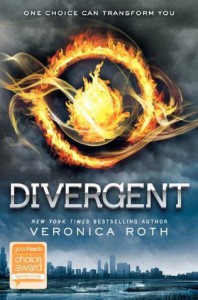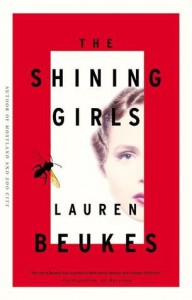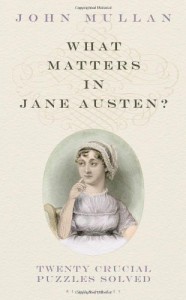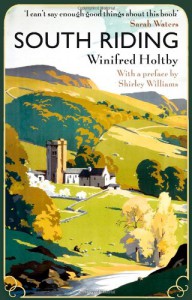 I loved the anger of the first chapter; the rest of the book never quite lived up to this for me. I didn't find the story of how Nora came to be angry as interesting as the rage itself, and I would possibly have cared more about what she actually did following the events in the novel. The story itself felt oddly paced: very drawn-out at first, and then the ending felt rushed.
I loved the anger of the first chapter; the rest of the book never quite lived up to this for me. I didn't find the story of how Nora came to be angry as interesting as the rage itself, and I would possibly have cared more about what she actually did following the events in the novel. The story itself felt oddly paced: very drawn-out at first, and then the ending felt rushed.
 Four stars is for the Keisha / Natalie section, which I loved: the small, seemingly casual episodes that showed so much about all the characters.
Four stars is for the Keisha / Natalie section, which I loved: the small, seemingly casual episodes that showed so much about all the characters.
 This is a laughably silly and implausible dystopian world, that doesn't even seem to have an internally consistent set of rules - just one e.g. you can choose your faction against your natural aptitude, so why is there such a focus on people in each faction thinking and acting in predictable ways? . However, it's also fun, action-packed, and a fast read.
This is a laughably silly and implausible dystopian world, that doesn't even seem to have an internally consistent set of rules - just one e.g. you can choose your faction against your natural aptitude, so why is there such a focus on people in each faction thinking and acting in predictable ways? . However, it's also fun, action-packed, and a fast read.
 1
1
 For books that cover similar ground, I liked this more than [b:The Forgotten Garden|3407877|The Forgotten Garden|Kate Morton|http://d202m5krfqbpi5.cloudfront.net/books/1327910234s/3407877.jpg|3448086], but less than [b:The Children's Book|6280379|The Children's Book|A.S. Byatt|http://d202m5krfqbpi5.cloudfront.net/books/1320548114s/6280379.jpg|5768221]. The Children's Book at least demonstrated that Olive was a convincing writer; in this book, the extracts of Vida Winter's stories did not. I did enjoy Vida's 'true' story, which had some atmosphere and a reasonably interesting mystery element. As a riff on Jane Eyre and Wuthering Heights it didn't add much by way of new perspectives.
For books that cover similar ground, I liked this more than [b:The Forgotten Garden|3407877|The Forgotten Garden|Kate Morton|http://d202m5krfqbpi5.cloudfront.net/books/1327910234s/3407877.jpg|3448086], but less than [b:The Children's Book|6280379|The Children's Book|A.S. Byatt|http://d202m5krfqbpi5.cloudfront.net/books/1320548114s/6280379.jpg|5768221]. The Children's Book at least demonstrated that Olive was a convincing writer; in this book, the extracts of Vida Winter's stories did not. I did enjoy Vida's 'true' story, which had some atmosphere and a reasonably interesting mystery element. As a riff on Jane Eyre and Wuthering Heights it didn't add much by way of new perspectives.
 I enjoyed the dystopian/post-apocalyptic elements, which felt plausible enought to satisfy me. It's also great as a coming-of-age story through difficult times. The protagonist, Lauren, is a strong and interesting character. My one caveat is that I found the attempts at creating a new belief system (Earthseed) dull and unconvincing, and wasn't sure how seriously I was meant to take this. This edition has a Q&A with the author included though, and the answer seems to be: quite seriously. It's easy enough to glide over those bits if you're not into them, and the story rips along pretty well after the first 100 pages.
I enjoyed the dystopian/post-apocalyptic elements, which felt plausible enought to satisfy me. It's also great as a coming-of-age story through difficult times. The protagonist, Lauren, is a strong and interesting character. My one caveat is that I found the attempts at creating a new belief system (Earthseed) dull and unconvincing, and wasn't sure how seriously I was meant to take this. This edition has a Q&A with the author included though, and the answer seems to be: quite seriously. It's easy enough to glide over those bits if you're not into them, and the story rips along pretty well after the first 100 pages.
 I was disappointed in this - I found it overlong, with one or two more story threads than seemed necessary (or interesting, given how much of the same ground they cover), and then it fizzled out with a pretty obvious 'secret' reveal.
I was disappointed in this - I found it overlong, with one or two more story threads than seemed necessary (or interesting, given how much of the same ground they cover), and then it fizzled out with a pretty obvious 'secret' reveal.
 I've now done 10 years in open-plan offices. There was an incident at work last year where two colleagues and I realised we’d formed our own self-confirming gossip circle: Colleague A shared a rumour with me, I passed it on to Colleague B, and then they’d got together, told each other, and believed the rumour now had multiple sources [“I heard she drank…” “Ooh, I heard that too”].So there were parts of this I related to very strongly, like the circuitous attempt to seek out the source of a particular rumour and the desire to know things, endlessly obsessing over trivial things [“my legitimate chair!”], congregating by the desk of the person with the best stories, how much time you can spend with people without really knowing them, how trivially irritating it can all be, the vague and generally unacted-upon sense that you could or should do something else, something better or more satisfying.Ferris, and the use of the collective ‘we’ to narrate, capture all this incredibly well. While the characters mostly stay on the surface, each has moments where you realise that that they’re much more than that, but that the workplace doesn't care or know what to do with the surplus.The book was weirdly compelling for me, and both sad and occasionally quite funny.
I've now done 10 years in open-plan offices. There was an incident at work last year where two colleagues and I realised we’d formed our own self-confirming gossip circle: Colleague A shared a rumour with me, I passed it on to Colleague B, and then they’d got together, told each other, and believed the rumour now had multiple sources [“I heard she drank…” “Ooh, I heard that too”].So there were parts of this I related to very strongly, like the circuitous attempt to seek out the source of a particular rumour and the desire to know things, endlessly obsessing over trivial things [“my legitimate chair!”], congregating by the desk of the person with the best stories, how much time you can spend with people without really knowing them, how trivially irritating it can all be, the vague and generally unacted-upon sense that you could or should do something else, something better or more satisfying.Ferris, and the use of the collective ‘we’ to narrate, capture all this incredibly well. While the characters mostly stay on the surface, each has moments where you realise that that they’re much more than that, but that the workplace doesn't care or know what to do with the surplus.The book was weirdly compelling for me, and both sad and occasionally quite funny.
 "But you know that writing down something somebody says out loud is not a matter of transcribing. Because written stuff said out loud on the page doesn't look said out loud. It just looks crazy." This is a quote from DFW nearly two-thirds through this transcribed interview, and it sums up why I find this hard to rate. It has some very interesting moments, and some neat insights into [b:Infinite Jest|6759|Infinite Jest|David Foster Wallace|http://d202m5krfqbpi5.cloudfront.net/books/1165604485s/6759.jpg|3271542]. If you like Wallace's work, it's worth reading.However, its form distracted me. It is mostly transcribed conversation, which isn't the easiest to read. Lipsky's bracketed commentary is annoyingly obvious and his condensing of his own side of the conversation doesn't help the flow. His one track focus on a few points got really tiresome; particularly his odd desperation to get Wallace to admit that he enjoyed the publicity and hype surrounding Infinite Jest.
"But you know that writing down something somebody says out loud is not a matter of transcribing. Because written stuff said out loud on the page doesn't look said out loud. It just looks crazy." This is a quote from DFW nearly two-thirds through this transcribed interview, and it sums up why I find this hard to rate. It has some very interesting moments, and some neat insights into [b:Infinite Jest|6759|Infinite Jest|David Foster Wallace|http://d202m5krfqbpi5.cloudfront.net/books/1165604485s/6759.jpg|3271542]. If you like Wallace's work, it's worth reading.However, its form distracted me. It is mostly transcribed conversation, which isn't the easiest to read. Lipsky's bracketed commentary is annoyingly obvious and his condensing of his own side of the conversation doesn't help the flow. His one track focus on a few points got really tiresome; particularly his odd desperation to get Wallace to admit that he enjoyed the publicity and hype surrounding Infinite Jest.
 'I ask my students,' the saxophone teacher says, 'is your life a gift worth giving? Your normal, vanilla-flavoured life, your two-minute noodles after school, your television until ten, your candles on the dresser and facewash on the sink?' She smiles and shakes her head. 'Of course it isn't, and the reason for that is that they simply haven't suffered enough to be worth listening to.'It took a couple of goes to get beyond the first 8 pages, but I really enjoyed this semi-experimental novel. It mixes up the story of a scandal at a semi-posh girls' school and a drama school play about the incident. The scenes at the girls' school or from the play about it were the most compelling for me: there were some brilliant characterisations. I was far less interested in the chapters that focused on the drama school audition and training process,
'I ask my students,' the saxophone teacher says, 'is your life a gift worth giving? Your normal, vanilla-flavoured life, your two-minute noodles after school, your television until ten, your candles on the dresser and facewash on the sink?' She smiles and shakes her head. 'Of course it isn't, and the reason for that is that they simply haven't suffered enough to be worth listening to.'It took a couple of goes to get beyond the first 8 pages, but I really enjoyed this semi-experimental novel. It mixes up the story of a scandal at a semi-posh girls' school and a drama school play about the incident. The scenes at the girls' school or from the play about it were the most compelling for me: there were some brilliant characterisations. I was far less interested in the chapters that focused on the drama school audition and training process,
 I loved this - the concept is cleverly managed and the characters are so well written, down to the most minor. The variations on WWII experiences were fascinating.
I loved this - the concept is cleverly managed and the characters are so well written, down to the most minor. The variations on WWII experiences were fascinating.
 1
1
 Interesting concept, fast-paced and compelling. I particularly liked the historical elements as the author introduced each of the 'girls'. The main character, Kirby, is well-done and interesting to read about. Ultimately though I found it a bit unsatisfying; I think things about serial killers are just not for me. It's not like there is a good reason to go around killing people, and often an attempt to create a backstory that 'explains' it is just reductionist - but it ended up feeling a bit empty to me.
Interesting concept, fast-paced and compelling. I particularly liked the historical elements as the author introduced each of the 'girls'. The main character, Kirby, is well-done and interesting to read about. Ultimately though I found it a bit unsatisfying; I think things about serial killers are just not for me. It's not like there is a good reason to go around killing people, and often an attempt to create a backstory that 'explains' it is just reductionist - but it ended up feeling a bit empty to me.
 Really interesting if you love Jane Austen's works. This gives fascinating insights into life at the time Austen was writing, explaining a lot of things that her contemporary readers would take for granted. Mullan also explores Austen's technique and originality as an author. The book uses examples from all Austen's works and from her personal letters. It's an easy read, not overly academic.
Really interesting if you love Jane Austen's works. This gives fascinating insights into life at the time Austen was writing, explaining a lot of things that her contemporary readers would take for granted. Mullan also explores Austen's technique and originality as an author. The book uses examples from all Austen's works and from her personal letters. It's an easy read, not overly academic.
 1
1
 I liked the literary themes, the main character, and her relationship with her dad. The last third was a fantastic mystery story, and is the main reason this gets four stars. Overall it is a bit too derivative of [b:The Secret History|29044|The Secret History|Donna Tartt|http://d.gr-assets.com/books/1327733397s/29044.jpg|221359], but the supporting characters in the inner circle are not nearly as well realised. There never seemed a credible reason why the teacher, Hannah, would select that group of students to hang around with and they almost never got rose above basic stereotypes.
I liked the literary themes, the main character, and her relationship with her dad. The last third was a fantastic mystery story, and is the main reason this gets four stars. Overall it is a bit too derivative of [b:The Secret History|29044|The Secret History|Donna Tartt|http://d.gr-assets.com/books/1327733397s/29044.jpg|221359], but the supporting characters in the inner circle are not nearly as well realised. There never seemed a credible reason why the teacher, Hannah, would select that group of students to hang around with and they almost never got rose above basic stereotypes.
 I liked this a lot. It's coming of age with horses, but not starry-eyed Pony Club horses. This is about the reality of making a living from animals: they're not always predictable, the danger and occasional violence of what it means to wean a foal or break a horse. I was never a horsey girl, but this version of it was interesting to me.Alice is a great character, 12 years old, not always likeable or nice, but you understand her and why she does what she does. Her family is dysfunctional, but none of the characters are one-note, and they all surprise Alice at some point in the book.
I liked this a lot. It's coming of age with horses, but not starry-eyed Pony Club horses. This is about the reality of making a living from animals: they're not always predictable, the danger and occasional violence of what it means to wean a foal or break a horse. I was never a horsey girl, but this version of it was interesting to me.Alice is a great character, 12 years old, not always likeable or nice, but you understand her and why she does what she does. Her family is dysfunctional, but none of the characters are one-note, and they all surprise Alice at some point in the book.
 3.5 really, I have quite mixed opinions. Sarah Burton is an interesting and very strong character, especially given when this is set and was written. I enjoyed reading about her a lot.There were some stunning bits of writing with great character insight, into Sarah and some of the vignettes featuring more minor characters. I'm thinking about the episode with poor Miss Sigglesthwaite as an example.On the other hand, I always struggle with the view of mental illness in some books from this timeframe. Carne's wife follows the typical pattern: high strung, risky behaviour, promiscuous sex (or maybe just any sex), breakdown ... then is suddenly unable to recognise people, flies into rages, or just stares at the wall. It never seems real - what would cause this? - or more than a convenient plot contrivance and forced parallel to Jane Eyre. I also find it hard to remain in sympathy with Carne, whom I believe I'm supposed to find noble and good, when at one point he admits to raping his mentally unstable wife.As a result, I was never entirely convinced some storylines eg Sarah's sudden descent into mad and seemingly unrequited love for him . Similarly, I liked the Hollys a lot, but there was only a half-hearted attempt to explain why Mrs Brimsley would decide to marry and support Mr Holly and his too many kids. Very well-written, an interesting look at the tensions in pre-WWII small town England, some great characters, but not without flaws.
3.5 really, I have quite mixed opinions. Sarah Burton is an interesting and very strong character, especially given when this is set and was written. I enjoyed reading about her a lot.There were some stunning bits of writing with great character insight, into Sarah and some of the vignettes featuring more minor characters. I'm thinking about the episode with poor Miss Sigglesthwaite as an example.On the other hand, I always struggle with the view of mental illness in some books from this timeframe. Carne's wife follows the typical pattern: high strung, risky behaviour, promiscuous sex (or maybe just any sex), breakdown ... then is suddenly unable to recognise people, flies into rages, or just stares at the wall. It never seems real - what would cause this? - or more than a convenient plot contrivance and forced parallel to Jane Eyre. I also find it hard to remain in sympathy with Carne, whom I believe I'm supposed to find noble and good, when at one point he admits to raping his mentally unstable wife.As a result, I was never entirely convinced some storylines eg Sarah's sudden descent into mad and seemingly unrequited love for him . Similarly, I liked the Hollys a lot, but there was only a half-hearted attempt to explain why Mrs Brimsley would decide to marry and support Mr Holly and his too many kids. Very well-written, an interesting look at the tensions in pre-WWII small town England, some great characters, but not without flaws.


